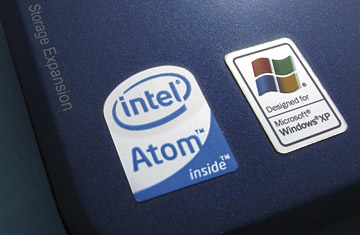
An Intel Inside sticker
Intel likes to say its domination of the global computer chip market is down to its technological prowess. But rivals say it's ruthless, illegal sales techniques that have made the difference.
On Wednesday The European Commission agreed with Intel's opponents as it fined the chipmaking giant a record $1.45 billion for skewing the market. The Commission — the European Union's antitrust authority — said Intel tried to squeeze out competition by paying PC makers and retailers not to use rival chips. The Commission's 542-page ruling also contained a cease-and-desist order, requiring the Santa Clara-based company to change its business practices in Europe. (See pictures of the financial crisis in London.)
It's a humiliating blow for Intel, which has played a key role in developing chip technology for over four decades, and can now claim a staggering 80.5% market share in microprocessors. But it represents vindication for Intel's semiconductor rival Advanced Micro Devices (AMD), which filed the original complaint in 2000. And it also underlines the power and authority of the Commission, which has now established itself as the world's most feared antitrust regulator.
E.U. Competition Commissioner Neelie Kroes said Intel's predatory pricing practices were specifically designed to muscle out AMD, whose current market share is a relatively meager 12%. "Intel has harmed millions of European consumers by deliberately acting to keep competitors out of the market for computer chips for many years," she said. "Such a serious and sustained violation of the E.U.'s antitrust rules cannot be tolerated." (See pictures of Obama's trip to Europe.)
The Commission ruling hinged on two key issues. Firstly, that Intel abused its dominant market position with hidden financial incentives that restricted or blocked the use of AMD chips — which are cheaper, but have similar specifications — in computers sold in the E.U. Intel also paid major retailers on condition they stock only computers with Intel central processing units (CPUs).
The second concerned payments to prevent firms from designing hardware around AMD chips: Intel paid PC makers to delay or scrap the launch of new computers containing their rival's products. "Intel limited consumer choice and stifled innovation by preventing innovative products for which there was a consumer demand from reaching end customers," the Commission said.
Intel responded by announcing it would appeal in the E.U.'s courts. "We believe the decision is wrong and ignores the reality of a highly competitive microprocessor market," Intel chief executive Paul Otellini said. "There has been absolutely zero harm to consumers. Intel will appeal."
Although the financial impact of the fines will mean little to a company that last year earned $37.6 billion, the damage to its reputation may last longer. The Commission's arguments are expected to provide ammunition in a separate Federal Trade Commission investigation into similar anti-competition claims in the U.S., probes by the New York State Attorney General, and a U.S. civil suit filed by AMD in 2005. (See pictures of TIME's Wall Street covers.)
While Intel does not deny its rebate program, it argues that consumers were more helped than hurt from a price perspective. "Regulations should not prevent one company, no matter how large that company is, from offering discounts or providing incentives," said Intel General Counsel Bruce Sewell. He also noted that AMD, "the sole complainant in this case, is alive, healthy, and claims to be expanding its business."
However, European consumer group BEUC says Intel has wrought enough damage to warrant a collective court action for compensation. "Consumer choice is the heartbeat of a competitive economy," BEUC Director General Monique Goyens said in a statement. "Intel should be liable to compensate the victims of its illegal practices. Consumers have been paying too much for their computers and they should be compensated."
Intel's fine is the largest ever by the Commission, dwarfing the previous record of $675 million (at current exchange rate) on Microsoft in 2004. However, the Microsoft fines grew to $1.16 billion last year because the software giant failed to comply with the original 2004 ruling. (See pictures of the dangers of printing money in Germany.)
The lesson for Intel should be to avoid tangling with the Commission, says Michael Tscherny, a partner at the GPlus Europe consultancy in Brussels and a former Commission competition spokesman. "Like Microsoft, Intel went for a confrontational approach, and it lost," he says. "I understand Intel's court appeal, but I expect it to fail. Intel is not a philanthropic company — it only was offering discounts to win business. But even big companies like Intel have to play by the rules."
